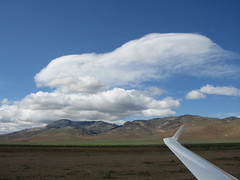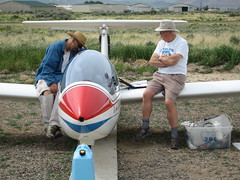May 31, 2006
Backseat Flying and Professional Mentoring
Over the weekend I had the chance to ride in the backseat of one of our club's two-seat gliders for several flights. As a new member of our club's "flight committee" I may occasionally fly with new [to us] pilots after a certified instructor has pronounced them competent to fly the aircraft. My role is that of an observer and someone who can welcome them to our club, maybe providing some local knowledge along the way.
Inevitably though, I found myself watching how the other pilot flies and making minor suggestions for improvement if they seemed open to it. Maybe they simply need to relax and stop over-controlling the plane. Or perhaps a bit more focus on maintaining a particular airspeed in the landing pattern will help. A couple times I would offer to take the controls to demonstrate a technique for accomplishing something. I found it easier to describe what to do while I was doing it myself.
Now I've flown in the backseat numerous times, but that's usually when I'm co-flying with a friend or maybe giving someone a quick tour of a new airport and the surrounding landmarks. My goal was rarely to evaluate or judge.
What I noticed is how easy it is to pick out things that the guy in the front seat should try to improve. That's partly because, as one of my instructors once told me, I've got nothing else to do back there. But I suspect that it's largely because I used to make the same (or very similar) mistakes a couple years ago when I transitioned into the club gliders. Being just a few years "ahead" of them means that I have enough experience to identify these things but not so much that it's difficult to remember how I dealt with them.
This got me thinking about one of the truisms that comes up in flight training now and then: the best mentor is someone that's only a few steps ahead of you in the learning curve.
Looking back, I think that's just as true in the workplace too. There are times when I've had a good mentor to follow--someone I could strive to be more like in various ways: knowledge, skill, communication, etc. Those are the times when I made the greatest improvements in my job performance and felt like I had the most focus. Other times I've not been so lucky, lacking any real guide to model myself after and not sure what "better" looks like.
This has led me to conclude that good mentors are hard to find. Not only do they have to be open and receptive to the idea of you pestering them for help on various things, they also need to be a good match--someone you can look at and say "I really want to be more like that."
I think this is further complicated by jobs where the skills, unlike flying, are less concretely defined and difficult to demonstrate in a short period of time. "Tell me how well I mange this project" is very different from "was that a good landing?"
May 30, 2006
Nofollow No Good?
In Google's embarrassing mistake, which I thought was going to be about Google Web Accelerator, Dylan calls nofollow a failure.
Since its enthusiastic adoption a year and a half ago, by Google, Six Apart, Wordpress, and of course the eminent Dave Winer, I think we can all agree that nofollow has done Ö nothing. Comment spam? Thicker than ever. Itís had absolutely no effect on the volume of spam. Thatís probably because comment spammers donít give a crap, because the marginal cost of spamming is so low.
But it's worse than that, he claims.
Worse, nofollow has another, more pernicious effect, which is that it reduces the value of legitimate comments. Hereís how:
Why should I bother entering a comment on your blog, after all? Well, I might comment because youíre my friend. But I might also want some tiny little reward for participating in a discussion, contributing to the content on your site, and generally enhancing the value of the conversational Web. That reward? PageRank, baby. But if your blog uses the nofollow tag, youíve just eliminated that tiny little bit of reciprocity. Thanks, but no thanks. Iíd rather just comment on my own blog. And maybe, if youíre lucky, Iíll link back to you.
I've seen that first hand. The "psychology of linking" did change in a fairly obvious way after nofollow started. Unfortunately, that was a downside that none of us saw coming back when we announced our support. I'm not sure any of us expected people to ration their links as if they were somehow in limited supply. But it happened anyway.
Introducing even a fairly subtle and indirect "economic" model into a system always changes behavior. I know that I forget (or at least underestimate) that more often than I should.
Look. Linking is part of what makes the web work. If you're actually concerned about every link you make being counted in some global database of site endorsements, you're probably over-thinking just a bit. Life's too short for that, ya know? Link and be linked to. Let the search engines sort it out.
May 29, 2006
Getting Back in the Saddle
On Saturday I arrived back home after being gone and mostly disconnected for roughly two weeks. I was curious to see how much stuff piled up, waiting for my attention, while I was hanging out with great people, sleeping in a tent, teaching, learning, flying, and otherwise avoiding the Internet.
I fired up Thunderbird to find that there were approximately 2,100 messages waiting for me in my work account. 80% of them were spam and removed automatically. Another 10% were clearly not things I needed to read, so I filed them into the "archive" folder without opening them. Another 3-5% were spam that I had to manually mark as spam.
But that still left something like 125 messages in my inbox that demand some sort of attention from me: read, process, respond, put on calendar, etc.
I marked all but two folders in FeedDemon as "read" immediately. I strongly suspect that anything truly important that took place in my world during those two weeks will make itself apparent in other ways. If not, it probably wasn't important. I should probably cut my feed subscriptions in half. Again.
I tried to keep up with my personal email every few evenings while I was out, but there are probably still 40 or so messages with stars next to them in my Gmail account.
In other words, my "welcome back" workload is now back to a semi-reasonable level.
It was quite refreshing to not spend 8-12 hours a day in front of a computer, sending email to people who work a minute's walk from me, dealing with weekly meetings in which little is actually accomplished, getting caught up in the "news" of the day, and keeping half a dozen plates spinning.
Something about all that needs to change. I'm not quite sure what, but I've got a few ideas worth thinking about more.
I should have done this a year ago, but I'm also glad to be back at home. And my cats are glad to have me here too.
Did I miss anything important? Probably not. But let me know if I did.
May 11, 2006
Heading Out For Two Weeks
I've never done this before. In the past 6.5 years, I can't remember a time when I took much more than a single week off for vacation. And given that I appear to now have just over 7 weeks of vacation time accumulated, it's high time I change that.
Over the last year or so I've traveled a fair amount for work, and I think that managed to trick a part of my brain into thinking that I was taking lots of vacations. In reality, work related travel is rarely relaxing. I'm always struggling to keep up with... work.
So, starting Friday morning I'm heading out for a couple weeks. I may or may not post much here during that time but probably will post photos, so keep an eye on my Flickr stream if you're curious.
It's time to relax, clear my head, hang out with friends, and enjoy the outdoors.
If I do manage to spend much effort thinking about work, I hope it's the result of stepping back quite a bit to consider what I've been up to during the past few years and what I'd like to do in the next few. I really need to do that, but I find it exceptionally difficult to do when I'm immersed in the Bay Area tech scene on a day to day basis.
A wise man once said "an unexamined life is not worth living."
A Barrel Roll while Pouring Iced Tea
I've heard rumors about a pilot who demonstrated that you can pour a drink in the cockpit while doing a barrel roll and not spill a drop. Thanks to the magic of YouTube and an email tip, I have finally seen the video.
Since a barrel roll is a positive G maneuver (properly executed), the story was always believable, but there's something about seeing it for myself that made me smile. :-)
Oh, the other high speed, power off, low flying antics in that video are quite entertaining too.
May 10, 2006
How Does That Improve Search?
I'm really not sure if Marissa simply drew the short straw again or if the person who wrote this text never took a critical thinking class. But in the mildly defensively titled Yes, we are still all about search is an unsupported assertion:
Google Desktop 4 gives you another way to improve search, by personalizing your desktop. New "Google Gadgets" deliver an array of information--ranging from games and media players to weather updates and news--straight to your desktop.
There's a bit of a leap in there. Do you see it?
We're told that Google Desktop 4 improves search, but that's not backed up by any evidence at all. Instead, we're presented with a non-sequitur about gadgets you can use to increase your day to day information overload.
How exactly does that improve search?
URLs in Print Media Should be Blue
I was sitting with a co-worker recently who was trying to locate a story in the Mercury News, which just happened to be sitting on the table. The article was about the Homebrew Mobile Phone Club's first meeting and happened to be on the front page of the Business section.
I then asked if they had a website and she scanned the article quickly. It then occurred to me that if URLs were printed in blue in the newspaper, they'd be a lot easier to find. After all, it's a convention most people would recognize. And they're already printing in color anyway.
Just a thought...
May 09, 2006
My Top Ten Sources
Quite some time ago, Irina (her take) asked me to write up my "top 10 sources" for Top 10 Sources. As usual, it took longer than expected. But I finished a few days ago and it's now live: Jeremy Zawodny's Top 10.
Picking my ten favorite sources took me a bit longer than I thought it would. It's not because I'm lazy (I am) or because I've been busy (I have). No, it's because I never really thought that hard about why I like the blogs I read. What is it about a particular person's musings that is able to grab and hold my attention over time? What makes me go back for more, day after day?
You know, I can barely remember back to when I was using AmphetaDesk to read less than 20 feeds. I even patched the code once to fix a bug that annoyed me before switching to Bloglines, which lasted for a few months. Once I hit 60 or so feeds, I ditched to idea of having a blogroll on my site.
I'd share my OPML but it's kinda painful to do. It changes often and I haven't found the time to automate it. If I had, there'd be some sort of blogroll-like thing on my site.
Until that day comes, this will have to do.
Who is on your top 10 list?
May 08, 2006
Internal Tools Engineer Needed
I'm trying to help someone find qualified folks to fill a job openeing we have in the Search group at Yahoo. The requirements are, roughly:
- C/C++ on Unix (~5 years)
- Basic Networking Skills
- Basic Unix Systems Programming Skills
- Perl or scripting as a bonus (if not, you'll get to learn)
The job is on-site in Sunnyvale, California area. The role is helping to build and support some internal real-time monitoring tools.
Know anyone?
Resumes to: jzawodn@yahoo-inc.com
Thanks!
May 05, 2006
Damn It Feels Good To Be a Gangster: Office Space T-Shirts
![]() Like many geeks, I have a particular fondness for the movie Office Space. I've easily seen it more than 30 times and pretty much know all the lines. But I still notice something new every time I watch it. For example, when Derek was in town, we watched it one night and he pointed out the little plastic army guys in the background of the "case of the Mondays" scene.
Like many geeks, I have a particular fondness for the movie Office Space. I've easily seen it more than 30 times and pretty much know all the lines. But I still notice something new every time I watch it. For example, when Derek was in town, we watched it one night and he pointed out the little plastic army guys in the background of the "case of the Mondays" scene.
 So you can imagine my joy when discovering that CultClassicTs.com has a good selection of classic Office Space quotes and images available for order on your choice of T-shirt.
So you can imagine my joy when discovering that CultClassicTs.com has a good selection of classic Office Space quotes and images available for order on your choice of T-shirt.
Part of me is really disappointed for not thinking of doing this myself several years ago. But that's water under the bridge.
 My personal favorites are:
My personal favorites are:
- No Talent Ass Clown
- It's not that I'm lazy...
- Initech
- Have you seen my stapler?
- Damn it feels good to be a gangster
Needless to say, I ordered more than a couple shirts earlier this week. :-)
Island Living
Back in January, I wrote about a few coworkers who were leaving Yahoo to take some time off. One of them was Andy:
Second is Andy. He's leaving Yahoo in a couple weeks and plans to, quite literally, travel the world. He already has plane tickets to far-flung destinations, a small assortment of gear ready to pack (he's trying to travel light), and quite a list of other places he'd like to see. I'm a little jealous.
Andy has been documenting his trip on gone living and posting pictures on Flickr.
His latest entry recounts the simple island life he's been living for the last few days:
the days are simple: i wake up early in the mornings, eat a simple breakfast and drink some bali coffee, and i get in a boat for the morning's dive. then we come back in the afternoon, there's a few hours break for lunch, and then it's diving again until 3. today, besides all of the great coral and tropical fish, we also saw giant sea turtles and a shark! (don't worry, the sharks that live here haven't attacked divers) after that, i lie out on the beach or on the porch of my bungalow, read, write, and relax.
Nice. It reminds me of simplicity of summertime back in Ohio before I was old enough to get a part-time job.
What about dinner?
in the evenings, there is a sand road strip of thatched huts that contain bungalows, restaurants, and bars, so it's fresh-barbequed fish caught off the island or indonesian curries for dinner. the party for the night (all 30 people of it) is usually at one of the bars nearby within a minute's walk from home, where travellers drink together until late in the night.
Life wouldn't be complete without a soundtrack, of course:
the soundtrack to all of this is roosters crowing and indonesian voices and horse bells jingling and waves crashing and cafe stereo systems playing american pop music and movies. as i write this down, lenny kravitz playing somewhere, urging me to know that "yesterday is gone".
This is just a small taste of Andy's adventures. He's already been to Fiji, Australia, New Zealand, and Brunei. He has plans to hit many more places, including Lebanon, Jordan, Italy, Hong Kong, Holland, Russia, and many others.
May 03, 2006
The hReview Microformat in Yahoo! Tech
Alex points out a nice little gem in the new Yahoo! Tech site. All the reviews are marked up in hReview.
Ted put it in at some point, and with pretty much everything being optional it wasn't too hard to do. Check out Powershot A50, which seems to have a fairly large number of quality user reviews.
Kick ass.
Microformats are slowly but surely going to create a whole new web of data, ripe for mining, indexing, and exploring.
May 01, 2006
Google's Double Standard
Okay, there's been too much written about this already, so I'll try to keep my 2 cents short.
Concerned about Microsoft's decision to make MSN Search the default search engine in Internet Explorer 7 (earth shattering, isn't it?), Marissa Mayer said:
"The market favors open choice for search, and companies should compete for users based on the quality of their search services," said Marissa Mayer, the vice president for search products at Google. "We don't think it's right for Microsoft to just set the default to MSN. We believe users should choose."
Here are both of my cents:
First off, I agree that companies should compete based on quality. But Microsoft and McDonald's are both shining examples of how that's not necessarily the way it works when "the market" is involved in the decision making. Price and convenience tend to trump quality.
However, if that's what Google or Marissa really believe, why did they enter into an agreement that'd result in paying $1 billion to Dell Computer in exchange for a Googlized web browser on the computers they ship?
Right! Because many users don't choose. And Google decided to take advantage of that fact.
Now that Microsoft is doing the same, it's suddenly a big deal.
Cry me a river...
Google has been pushing their toolbar for Internet Explorer very aggressively ever since information about Internet Explorer 7 was first available several months ago. The writing was on the wall and they could see it as well as anyone.
If Google actually cared about user choice, they'd have asked the Mozilla Foundation to configure Firefox to prompt you to choose your favorite search engine the first time you ran it. You know, a level playing field.
Did they do that?
No!
Instead they bought their way into the default position with a revenue sharing deal. And now they're upset because they can't do the same with Internet Explorer. Well, they can but they're gonna have to pay OEMs like Dell, Gateway, HP, and so on. That's a lot of deal making and a lot more money that'll hit their earnings in the form of TAC (Traffic Acquisition Costs).
And let's not forget about Safari, where Google is the default and it's very hard for normal people to change that.
I don't know about you, but this whole "user choice" argument smells like a double standard to me. Don seems to think so.
Did they think we weren't paying attention?



